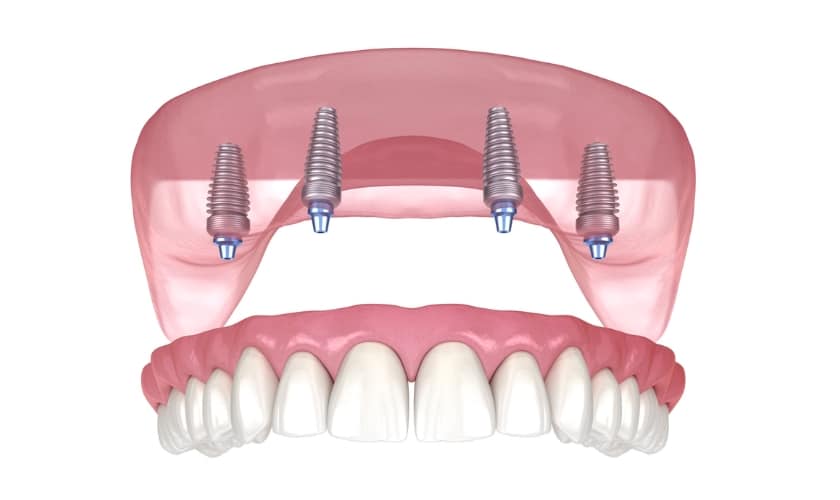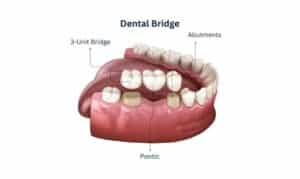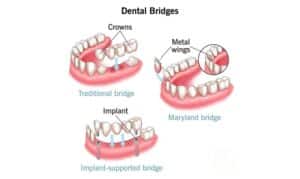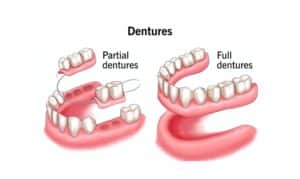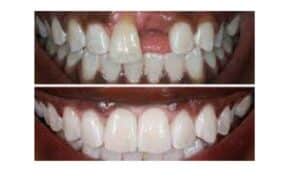Are there one or two front teeth missing from your mouth? It can be very upsetting and have an impact on your confidence as well as how you look. Fortunately, you can restore your smile and regain the confidence you deserve with a number of dental implant substitutes. To help you make an informed choice, we will thoroughly examine each of the alternatives to dental implants in this blog post and weigh the advantages and disadvantages of each. Now let’s get started and learn which front tooth replacement option is the best! We at FLOSS Dental Sugar Land know how vital it is to have a beautiful, healthy smile. To help you select the treatment that works best for you, we are here to walk you through a range of options.
Alternatives to Dental Implants
Many factors can lead someone to seek alternatives to dental implants for front teeth. Medical conditions, jawbone deficiency, financial constraints, or fear of surgery are common considerations. The type of front tooth loss (trauma, decay, or periodontal disease) also influences treatment choices.
- Dental Bridges
- Dentures
- Veeners
Let’s understand each options
1. Dental Bridges
Dental bridges offer a fixed solution for replacing missing front teeth. Traditional, cantilever, and Maryland bridges are common types. Advantages include stability and a natural appearance, but drawbacks include the need to alter adjacent teeth and potential pressure sensitivity. Costs are generally lower than implants, and advancements like implant-supported bridges provide added stability.
Types of Dental Bridges:
- Traditional bridge: This is the most common type, where crowns are placed on the abutment teeth and the pontics are suspended between them.
- Cantilever bridge: This type is used when there is only one healthy tooth available next to the gap. The pontic is cantilevered off the crowned abutment tooth.
- Maryland bridge: This bridge uses metal wings bonded to the backs of the abutment teeth to support the pontics, minimizing the need to alter the front surfaces of the abutment teeth.
Advantages of Dental Bridges:
- Fixed and natural-looking: Bridges are permanently cemented in place, providing a stable and natural-looking restoration.
- Improved speech and chewing: Bridges restore proper bite and support, allowing for clearer speech and more comfortable chewing.
- Cost-effective compared to implants: Bridges are generally less expensive than multiple implants, making them a more budget-friendly option.
- Durable: With proper care, bridges can last for many years.
Disadvantages of Dental Bridges:
- Requires altering healthy teeth: The abutment teeth need to be prepared for crowns, which involves removing some tooth structure.
- Potential for pressure sensitivity: The abutment teeth may experience increased pressure, especially if the bridge replaces multiple missing teeth.
- Not suitable for everyone: Individuals with weak abutment teeth or insufficient jawbone may not be good candidates for bridges.
Dentures: An Alternative to Dental Implant
Dentures are detachable prosthetics that replace lost teeth and the surrounding gingiva. They are typically made from acrylic resin or a combination of acrylic and metal and come in two main varieties:
- Complete dentures: Replace all teeth in either the upper or lower jaw.
- Partial dentures: Replace only some missing teeth, supported by remaining natural teeth or implants.
Types of Dentures for Front Teeth:
- Acrylic partial dentures: Affordable and readily available, but may be thicker and less natural-looking.
- Metal framework partial dentures: More durable and thinner than acrylic, but metal clasps might be visible.
- Flexible partial dentures: Made from nylon, offering a comfortable fit but potentially less durable.
- Snap-on dentures: Implant-supported dentures that provide a secure, stable, and natural-feeling option.
Advantages of Dentures:
- Removable: Offer the convenience of being taken out for cleaning and maintenance.
- More affordable: Generally less expensive than implants or bridges.
- No surgery required: Avoids the potential risks and discomfort associated with surgical procedures.
- Can improve speech and chewing: Properly fitted dentures can restore functionality and enhance your ability to speak and eat clearly.
Disadvantages of Dentures:
- Potential for slippage: May not always fit perfectly, leading to slipping or discomfort.
- Bone resorption: Can contribute to bone loss in the jaw over time.
- Less natural feel and aesthetics: May not appear as natural as implants or bridges, especially for front teeth.
- Require regular cleaning and maintenance: Proper care is crucial to maintain hygiene and prevent denture damage.
Veneers as a Non-Invasive Option
Dental implants might not be the only option for replacing lost or broken front teeth. An additional choice that can improve your smile without surgery is veneers.
These thin, custom-made shells of porcelain or resin bond to the front surfaces of your teeth, effectively masking chips, cracks, gaps, and discoloration. Unlike implants, veneers require minimal alteration of your natural teeth, making them a more conservative option. Plus, they can be colored and shaped to seamlessly blend in with your smile for a natural-looking transformation. While veneers offer numerous advantages, they may not be suitable for everyone due to factors like tooth strength and alignment.
Advantages of Veneers
- Non-invasive: Requires minimal removal of existing tooth structure compared to implants.
- Natural-looking: Can be color and shape-matched to blend seamlessly with surrounding teeth.
- Stain-resistant: Maintains brightness over time with proper care.
- Durable: Can last for 10-20 years with proper care.
- Improves appearance: Can address chips, cracks, gaps, discoloration, and minor misalignment.
- Boosts confidence: Enhances smile aesthetics and self-esteem.
Disadvantages of Veneers
- Not suitable for all cases: Requires healthy underlying tooth structure and may not be appropriate for extensive damage or missing teeth.
- Irreversible procedure: Requires removing enamel; cannot be undone.
- Potential for sensitivity: Increased sensitivity to hot and cold temperatures, especially after placement.
- Costly: More expensive than some other options like bonding or crowns.
- Maintenance required: Regular brushing, flossing, and dental visits are crucial for longevity.
- Potential for chipping or damage: Not as strong as natural teeth and susceptible to chipping or breaking.
While dental implants are a popular choice for replacing missing front teeth, alternatives to dental implants exist to cater to individual needs and preferences. Consulting a qualified dentist in Sugar Land at FLOSS Dental Sugar Land is paramount in selecting the most suitable solution for achieving a healthy and confident smile.
